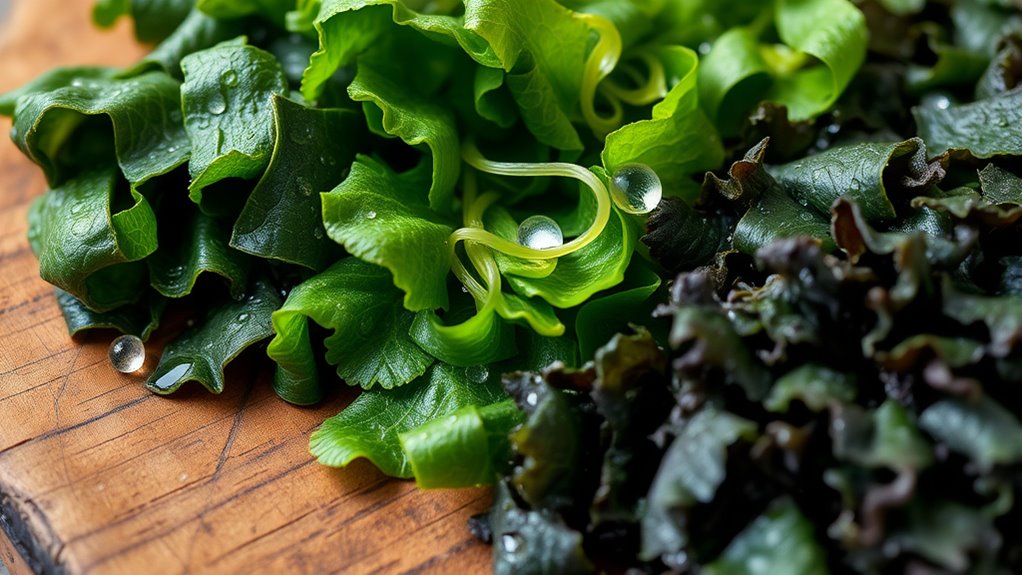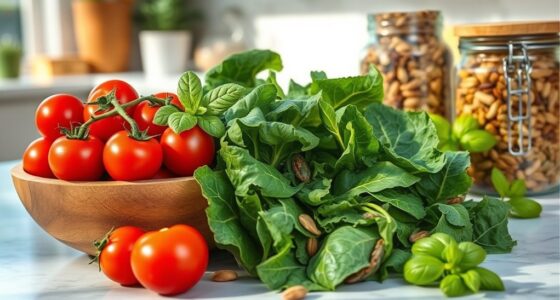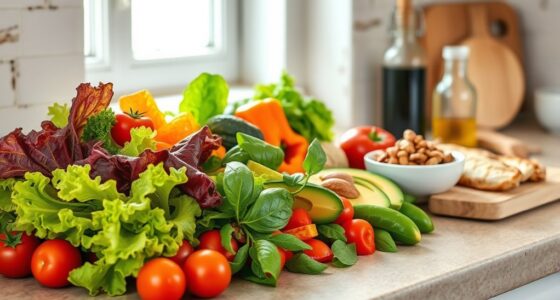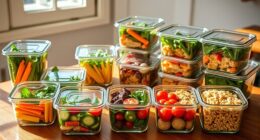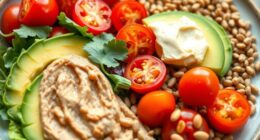To guarantee adequate iodine intake on a vegan diet, include sea vegetables like nori, kelp, wakame, and dulse, as they’re rich in iodine from seawater. Using iodized salt in cooking is another easy option, but be mindful of moderation to avoid excess. You can also explore vegan iodine supplements if dietary sources are limited. Keep learning how to balance your iodine intake for ideal thyroid health and overall well-being.
Key Takeaways
- Sea vegetables like nori, kelp, wakame, and dulse are rich plant-based iodine sources.
- Iodized salt provides a reliable and convenient way for vegans to meet iodine needs.
- Incorporating small portions of seaweed into meals can effectively boost iodine intake.
- Vegan iodine supplements are available and can help maintain adequate levels when dietary sources are limited.
- Moderation is essential to avoid excessive iodine consumption that can harm thyroid health.
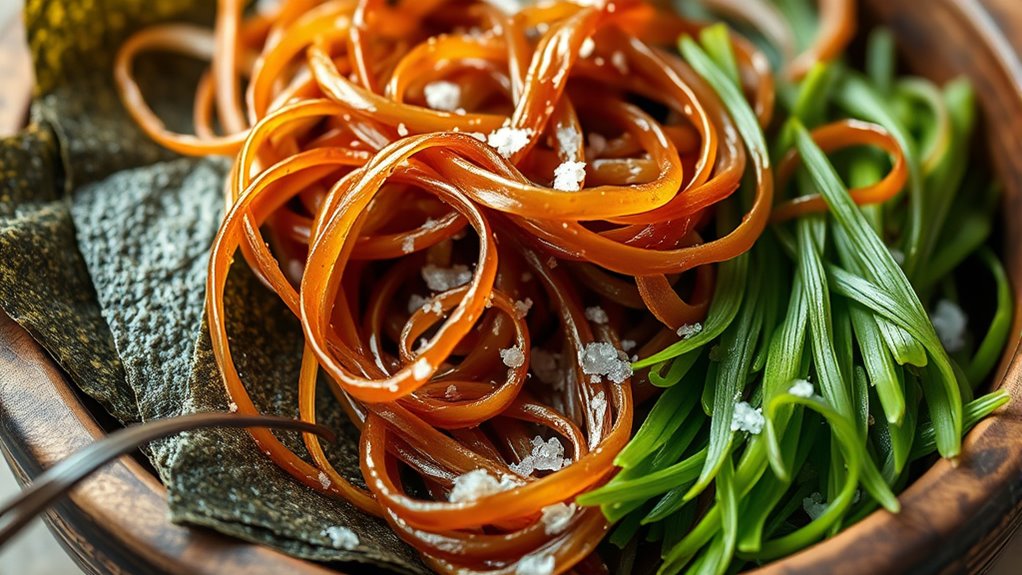
Are you aware of how essential iodine is for your health, especially on a vegan diet? Iodine plays a crucial role in supporting your thyroid function, which regulates your metabolism, energy levels, and overall hormonal balance. Without enough iodine, you risk developing iodine deficiency, leading to symptoms like fatigue, weight gain, and cognitive issues. Since vegans typically avoid animal-based sources like seafood and dairy, it’s vital to find alternative ways to meet your iodine needs. Relying solely on plant foods might not provide sufficient iodine, so understanding your options is key to maintaining optimal health.
Iodine is vital for thyroid health and hormonal balance, especially on a vegan diet.
Sea vegetables, such as nori, kelp, wakame, and dulse, are among the best plant-based sources of iodine. They naturally accumulate iodine from seawater, making them an effective way to boost your intake. Incorporating small portions of these seaweeds into your meals can help prevent iodine deficiency. However, it’s important to consume them in moderation, as iodine content varies widely depending on the type and source. Too much iodine can also harm your thyroid, so balancing intake is essential. If you’re unsure about how much seaweed to include, consulting a healthcare professional or a registered dietitian can help you determine safe, effective amounts.
In addition to sea vegetables, other plant-based options can contribute to your iodine intake, such as iodized salt. Using iodized salt in your cooking ensures you’re getting a reliable source of iodine without overdoing it. Keep in mind, though, that many processed foods contain non-iodized salt, so reading labels is important. Fortified foods can also be helpful, but since they’re less common in vegan diets, they shouldn’t be your sole source of iodine.
If you find it challenging to get enough iodine through diet alone, supplement options are worth considering. There are vegan-friendly iodine supplements available in capsule or tablet form designed specifically for those avoiding animal products. These supplements can be a convenient and reliable way to meet your daily iodine needs, especially if you’re not regularly consuming sea vegetables or iodized salt. However, it’s best to talk with your healthcare provider before starting any supplement regimen to determine the right dosage for you. Excess iodine can disrupt thyroid function, so moderation and professional guidance are key. Proper iodine intake is essential for maintaining thyroid health and overall well-being.
Frequently Asked Questions
Can Vegans Get Enough Iodine Without Supplements?
Yes, you can get enough iodine without supplements by choosing plant-based alternatives rich in iodine, like sea vegetables such as nori, kelp, and wakame. To maximize iodine absorption, include these in your diet regularly. Keep in mind that dietary sources vary in iodine content, so balance your intake carefully. If you’re unsure, consult a healthcare professional to ensure you’re meeting your iodine needs through your vegan diet.
Are Iodine-Rich Plant Foods Safe in High Amounts?
Iodine-rich plant foods can be safe if consumed in moderation, but eating too much may lead to iodine toxicity. While plant-based sources like sea vegetables provide essential nutrients, excessive intake can cause thyroid issues. It’s important to monitor your intake and avoid overdoing it. Stick to recommended amounts, and consult a healthcare professional if you’re unsure, to enjoy the benefits without risking iodine toxicity.
How Does Cooking Affect Iodine Levels in Sea Vegetables?
Cooking sea vegetables is like trying to catch sunlight; delicate, and prone to fading. Different methods, like boiling or steaming, affect nutrient retention variably. Boiling often causes iodine to leach into water, reducing its levels in the vegetables, while steaming preserves more iodine. To maximize iodine intake, opt for gentle cooking techniques, and avoid overcooking, so you don’t wash away this essential nutrient before it reaches your plate.
Are Iodine Supplements Suitable for Vegans?
Yes, iodine supplements can be suitable for vegans if you choose high-quality options. Look for supplements that specify the use of seaweed varieties known for their iodine content, like kelp or bladderwrack. Always check the supplement’s quality and dosage to avoid excess iodine intake, which can be harmful. Consult with a healthcare professional to ensure it’s appropriate for your needs and to determine the right amount.
What Are Signs of Iodine Deficiency in Vegans?
You may notice signs of iodine deficiency if you experience fatigue, weight gain, and cold intolerance, all indicating compromised thyroid health. Look for dietary indicators like dry skin, constipation, and memory issues, which can also signal iodine deficiency. Staying attentive to these signs helps you maintain your thyroid health. Incorporate iodine-rich foods like sea vegetables or consider supplements to prevent deficiency and support your overall well-being.
Conclusion
Think of iodine as the secret key to your health puzzle. By including sea vegetables like nori, kelp, and wakame, along with fortified foods and supplements, you can fill your iodine tank confidently. Just like a lighthouse guides ships safely to shore, these sources illuminate your path to balanced iodine intake. Stay mindful, stay nourished, and let these vibrant foods be your guiding stars on your vegan journey.
Ilana has been a vegan for over 10 years. She originally made the switch for health reasons, but soon found herself becoming more and more passionate about the ethical and environmental implications of a vegan lifestyle. Ilana is the author of The Graceful Kitchen, a blog all about veganism. She loves to cook up delicious and nutritious vegan meals, and share her recipes with others who are interested in leading a cruelty-free life. Ilana is also a strong advocate for using whole foods as the foundation of a healthy diet, and believes that going vegan is one of the best ways to achieve this.
